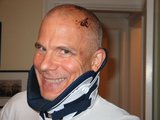People on Facebook have inviting their FB friends to list the top ten books that have had the greatest impact in our lives. Some people start naming big-name classics like Cervantes, Tolstoy, Shakespeare, Joyce. This strikes me as rather uninteresting, but maybe I am just envious because I am not well-read in the classics. Others are surprisingly candid -- or perhaps, naive -- in listing some real crap, self-help junk, various pop-schlock titles. I guess I am somewhere between an intellectual and a moron; ignorant, but a snob.
Problem is, I can't bring myself to do this top ten list. I have been living 50+ years and reading for so long that I no longer remember very well the books that had a great impact at the time I read them, even where their impact was indeed great. The more recently read books tend to displace the old ones. So most of my top ten would be things from the past five years or so. All right, let's give it a try anyway:
(1) Nietszche - Thus Spoke Zarathustra. Made a huge impression on me when I was 16 years old, so it has to stay on the list. I may not have understood it deeply, but nevertheless.
(2) Juliet Schor - The Overworked American. I read it in the early 1990s and keep remembering it time and again, so it makes the list.
(3) Duke and Gross - America's Longest War. Greatly informed my thinking about the so-called War on Drugs, which I have been observing from the perspective of a judiciary employee for the past 20 years.
(4) Mathieu Ricard - Happiness. Picked up a copy while looking for something to do at an airport in December 2006. The timing was perfect. It actually changed my life for the better, permanently.
(5) Michael Pollan - The Omnivore's Dilemma. I was already leaning in the direction of a vegetarian diet, but after reading this, I changed the way I eat.
(6) The Gateless Barrier, a/k/a The Gateless Gate. I was a student at a zendo for about two and a half years, studying with a teacher. Maybe some of it was bullshit. But we went through this koan collection, and I did a lot of sitting (still do hit the mat every day). I know the exercise had a profound effect.
(7) Kurt Vonnegut - Slaughterhouse 5. I never read it until recently -- a couple years ago. I think it's one of the finest novels I have ever read.
(8) Haruki Murakami - 1Q84. It isn't just this novel, but that it introduced me to this writer and I went on to read several more of his books. You talk about a work of fiction grabbing you in the first few pages. This one grabbed me and did not let go for the next 900+ pages. I don't know what it is about this guy. He sees the world in a weird way that is peculiar to him, and yet... universal? "Remember: there is always only one reality." Really?
(9) Don deLillo - Underground. The one that begins at the famous Dodgers-Giants game in 1959. Man, that was one fucking good book.
(10) Terry Eagleton - Why Marx Was Right. My father and I have a decades-long history of talking about politics, about which we generally agree, although I have moved to the left of him. He lent me this book, and it had an enormous impact. Hitherto, I had often said I would consider myself a socialist but for the fact that I had not read any Marx or Engels, much less Lenin or Trotsky. I went on to establish contact with some real, practicing Marxists. In a conversation with one of them -- a particularly feisty and erudite old bastard whom I'll call Fred -- he scoffed at Why Marx Was Right, saying Eagleton was a "Catholic Marxist," i.e., something of a joke. But this book got me started reading some of the works of Trotsky, Lenin, Marx, Engels, and finding out for myself what the political theory is. Combining that with readings of countless contemporary articles that use Marxist methods of analysis, attending some lectures, and observing world events unfold through my own eyes, my political education has advanced greatly in the past two or three years. I am a Marxist-Trotskyist. In this capitalist culture, much of what my generation has been taught about history and socialism is utter nonsense. I have developed a reasonable level of confidence in my ability to sort out the truth from the bullshit.




